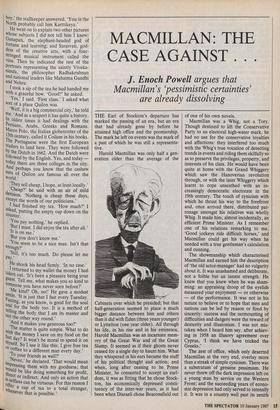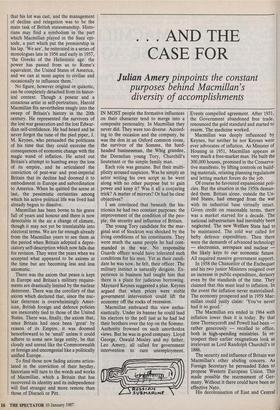MACMILLAN: THE CASE AGAINST . .
J. Enoch Powell argues that
Macmillan's 'pessimistic certainties' are already dissolving
THE Earl of Stockton's departure has marked the passing of an era, but an era that had already gone by before he attained high office and the premiership. The mark he left on events was the mark of a past of which he was still a representa- tive.
Harold Macmillan was only half a gen- eration older than the average of the Cabinets over which he presided; but that half-generation seemed to place a much bigger distance between him and others than it did with Eden (three years younger) or Lyttelton (one year older). All through his life, in his rise and in his eminence, Harold Macmillan was an incarnate mem- ory of the Great War and of the Great Slump. It seemed as if their ghosts never ceased for a single day to haunt him. What they whispered in his ears became the stuff of his political thought and action; and when, long after ceasing to be Prime Minister, he consented to accept an earl- dom, it was as fitting that he chose Stock- ton, his economically depressed consti- tuency of the inter-war years, as it had been when Disraeli chose Beaconsfield out of one of his own novels.
Macmillan was a Whig, not a Tory. Though destined to lift the Conservative Party to an electoral high-water mark, he had no use for the conservative loyalties and affections: they interfered too much with the Whig's true vocation of detecting trends in events and riding them skilfully so as to preserve the privileges, property, and interests of his class. He would have been quite at home with the Grand Whiggery which saw the Hanoverian revolution through, or with the later Whiggery which learnt to cope unscathed with an in- creasingly democratic electorate in the 19th century. The touch of cynicism with which he thrust his way to the forefront and, once arrived there, distributed pat- ronage amongst his relatives was wholly Whig. It made him, almost incidentally, an efficient Prime Minister. As I remember one of his relations remarking to me, 'Good jockeys ride difficult horses,' and Macmillan could get his way when he needed with a true gentleman's calculation and cunning.
The showmanship which characterised Macmillan and earned him the description of 'the old actor-manager' had no vulgarity about it. It was unashamed and deliberate, not a foible but an innate strength. He knew that you knew when he was sham- ming: an appraising droop of the eyelids measured your enjoyment — or otherwise — of the performance. It was not in his nature to believe or to hope that men and nations can be led by reason or fired by sincerity: success and the surmounting of difficulties and dangers were the reward of dexterity and illusionism. I was not mis- taken when I heard him say, after achiev- ing in 1958 an illusory agreement over Cyprus, 'I think we have tricked the Greeks.'
The zest of office, which only deserted Macmillan at the very end, overlay more than a streak of simple cynicism. There was a substratum of genuine pessimism. He never threw off the dark impression left on a young man by service on the Western Front; and the succeeding years of econo- mic depression had only served to intensify it. It was in a country well past its zenith that his lot was cast, and the management of decline and relegation was to be the main task of British statesmanship. Histo- rians may find a symbolism in the part which Macmillan played in the Suez epi- sode, a part which put the premiership in his lap. 'We are', he reiterated in a series of monologues late in 1956 and early in 1957, `the Greeks of the Hellenistic age: the power has passed from us to Rome's equivalent, the United States of America, and we can at most aspire to civilise and occasionally to influence them.'
No figure, however original or quixotic, can be completely detached from its histor- ical context. Though a poseur and a conscious artist in self-portraiture, Harold Macmillan fits nevertheless snugly into the sweep of Britain's history in the 20th century. He represented the survivors of the lost war generation and the lost Edwar- dian self-confidence. He had heard and he never forgot the tune of the pied piper, J. M. Keynes, who persuaded the politicans of his time that they could exorcise the consequences of economic change with the magic wand of inflation. He acted out Britain's attempt to humbug away the loss of its empire, and he articulated the conviction of post-war and post-imperial Britain that its decline had doomed it to embodiment in Europe and subordination to America. When he quitted the scene at last, the pessimistic certainties among which his active political life was lived had already begun to dissolve.
Macmillan has been borne to his grave full of years and honour and there is now detectable in the air a change of climate, though it may not yet be translatable into electoral terms. We are far enough already from the Macmillan years to see them as the period when Britain adopted a depre- ciatory self-description which now falls due for revision. They were the years when we accepted what appeared to be axioms at the time but are becoming less and less axiomatic.
There was the axiom that peace is kept in Europe and Britain's military require- ments are drastically limited by the nuclear deterrent. There was the corollary of that axiom which declared that, since the nuc- lear deterrent is overwhelmingly Amer- ican, British foreign and defence policies are inexorably tied to those of the United States. There was, finally, the axiom that, since Britain had once been 'great' by reason of its Empire, it was doomed henceforward to be `small' unless it could adhere to some new large entity, be that cloudy and unreal like the Commonwealth or foreign and uncongenial like a politically unified Europe.
To find those now fading axioms articu- lated in the conviction of their heyday, historians will turn to the words and works of Macmillan, which a Britain that has recovered its identity and its independence will find stranger and more remote than those of Disraeli or Pitt.











































 Previous page
Previous page